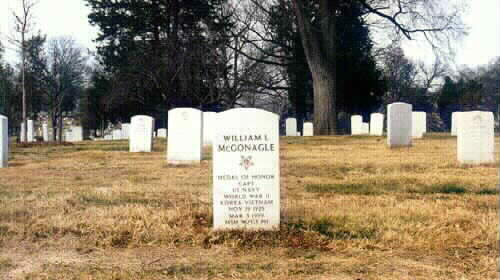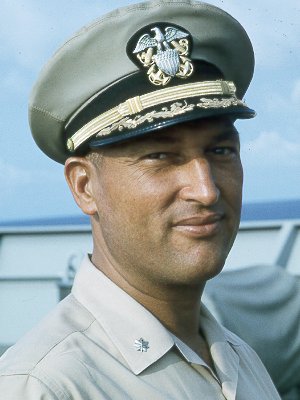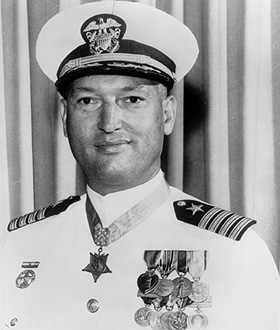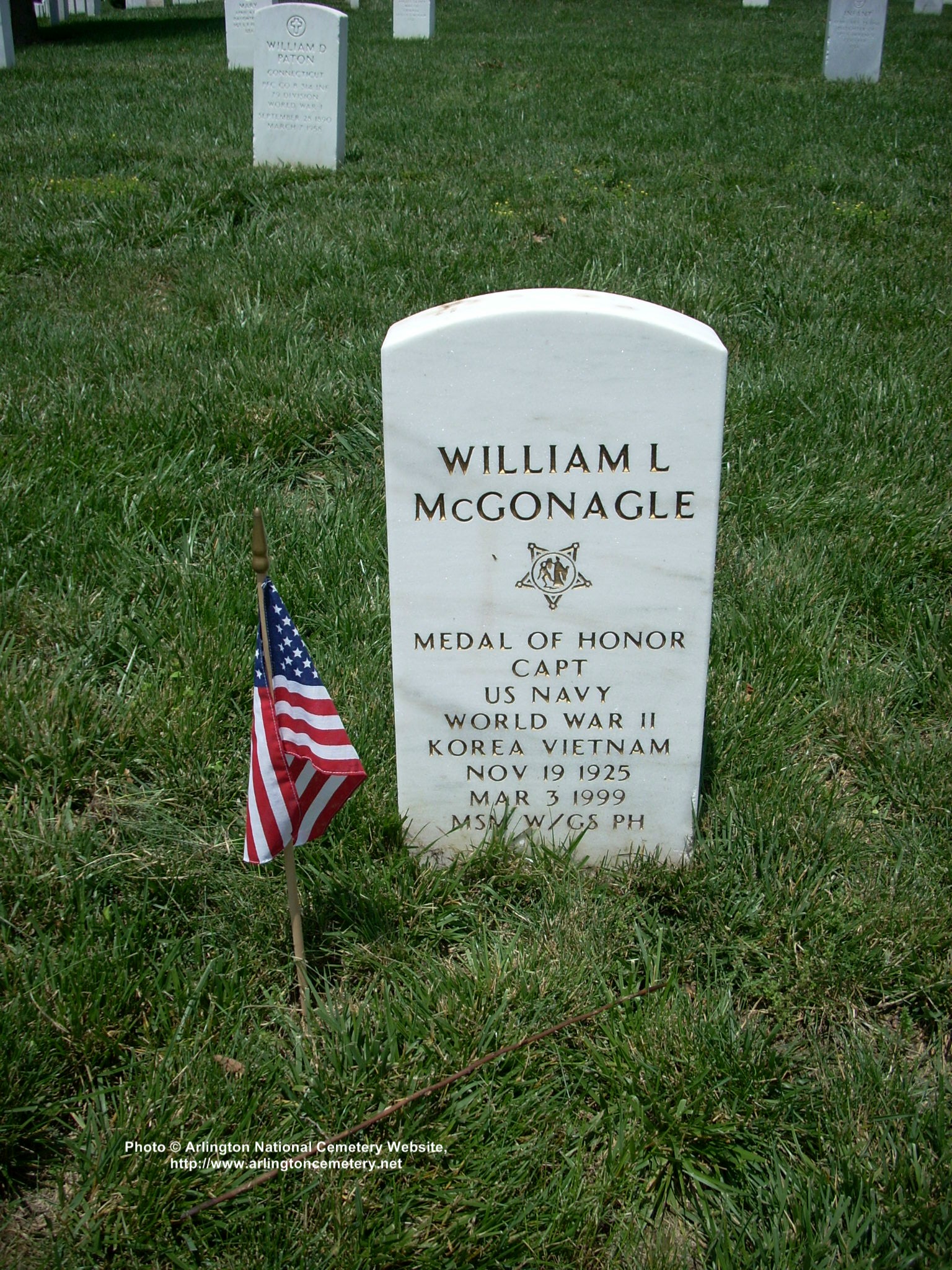Skipper of the USS Liberty and Medal of Honor recipient Captain William McGonagle, USN (Ret) to be buried at Arlington National Cemetery, April 9, 1999.
WHAT: Funeral Service and Burial for Captain William McGonagle, USN (Ret.)
WHEN: 9 a.m. Post Chapel, Fort Myer, Virginia followed by burial at Section 34, Arlington National Cemetery, Virginia.
WHO: Medal of Honor recipients, crew of USS Liberty and military officials will be in attendance. Eulogies will be given by: George Golden, representing the crew of the USS Liberty; and Cindy McGonagle, daughter of Captain McGonagle. He will receive full military honors and be buried in Section 34, near the common gravesite of six crew members killed in the USS Liberty incident.
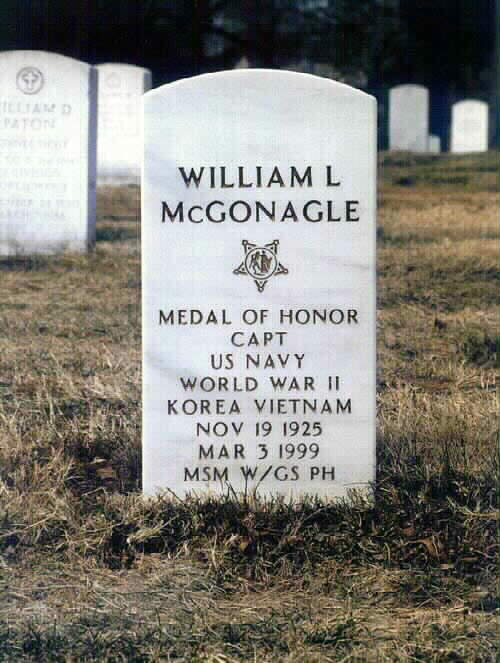
An Ambushed Crew Salutes Its Captain
Leader of USS Liberty Remembered
Saturday, April 10, 1999
One by one, they approached the grave to leave a single white rose, then stood ramrod straight, gazed off from the top of the cemetery's hill and snapped a crisp salute.
Most of them were portly men, graying old sailors in baseball caps and blue jackets that read “USS Liberty . . . Remember . . . 8 June 1967.” Beneath another tombstone at the bottom of the hill lay the remains of shipmates who had died that day.
Yesterday, the faithful survivors brought their long-dead comrades at Arlington National Cemetery the body of their captain — a reunion of seamen eternally bound by one of the most bloody and bizarre peacetime encounters in U.S. naval history.
Captain William L. McGonagle won the Medal of Honor for valiantly commanding the USS Liberty when the American spy ship was attacked by Israeli aircraft and torpedo boats in the Mediterranean during the 1967 Arab-Israeli War.
Thirty-four U.S. sailors were killed, and 171, including McGonagle, were wounded, among the crew of 300. Thirteen of the dead — including the remains of six in the mass grave at the bottom of the hill — were buried at Arlington.
The Israelis later apologized. But Liberty survivors, and some former U.S. officials, believe the attack was deliberate, staged to conceal Israel's pending seizure of the Golan Heights, which occurred shortly thereafter.
McGonagle, who died of lung cancer March 3, 1999 at the age of 73 in his Palm Springs, California, home, held his silence for years, torn by loyalty to the Navy and love for his crew and his ship. But even he, in recent years, came to conclude the attack was deliberate.
Yesterday, as six gray horses pulled a black caisson bearing a gold box of his cremated remains through flurries of spring blossom petals — and as four gray Navy F-14 fighters thundered overhead in tribute — most talk was of “Captain Bill.”
“Captain McGonagle was an honorable man,” Richard J. Brooks, 63, of Moyock, N.C., who was a 32-year-old master chief machinist's mate in the engine room on the day the Liberty was attacked, said as he stood near the grave yesterday.
“He was a gentleman, one of the best skippers the Navy ever had to command a ship, and most of all a dear friend,” said Brooks, who stood wearing a USS Liberty jacket. “I keep my shipmates, my skipper and my ship in my heart every day.”
Ernie Gallo, 54, of Dunn Loring, a baker's son from North Philadelphia who was a 22-year-old communications technician, gestured toward McGonagle's grave and then at his buddies: “It started with him. And these guys kept us alive. I wouldn't be here today if it wasn't for him and these guys.”
James Smith, 52, of Virginia Beach, who was a damage control worker that day, said: “I spent 25 years in the Navy. There were two men I'd follow anywhere, and he was one of them.”
McGonagle, born a sharecropper's son in Wichita, was a child of the Dust Bowl, who had joined the Navy to get out of poverty and the vegetable fields of Southern California. He had risen through the ranks and had assumed command of the Liberty on April 25, 1966. Originally a freighter built as a World War II “Victory” ship, the Liberty had been pulled from retirement and outfitted with millions of dollars of electronic eavesdropping gear, according to a former ship's officer, James M. Ennes Jr., who has written a book about the attack.
In December 1964, the Liberty was put to work as a spy ship. Three years later, with McGonagle now in command, it was hurried to the eastern Mediterranean, where the Arab-Israeli war had erupted.
Despite the deep concerns of McGonagle and his crew about their proximity to the war, the ship, armed only with a few .50-caliber machine guns, began a slow patrol 12 miles off Gaza.
The Liberty, code-named “Rockstar,” had been denied the protection of a destroyer by superiors who said it was “not a reasonable subject for attack,” according to Ennes. But about 2 p.m., after being buzzed by Israeli scout planes, the ship suddenly was assailed by Israeli jets firing rockets and dropping napalm.
Liberty sailors were gunned down as they scrambled for cover. The machine gun crews were tossed into the air like dolls. Flaming napalm blanketed parts of the ship. Sailors radioed frantically: “Any station, this is Rockstar. We are under attack.”
Then, after several passes by the jets, the torpedo boats arrived. After several misses, one struck home, blasting a 40-foot-wide hole below decks and killing 25 men almost instantly. All the while, McGonagle, his right leg riddled with shrapnel, maintained command, hollering orders — “Right full rudder! All engines flank!” — assessing the damage and trying to dodge the torpedoes.
“I saw him on the bridge during the height of the battle,” Ennes recalled in an interview. He “was just running through the fire and flying shrapnel and rocket parts, and he just ignored them. He just walked along yelling orders and doing his job.”
“He went onto the starboard wing of the bridge just as a napalm bomb hit,” said Ennes, who was not present yesterday. “I thought he was gone. And he just walked through the flames like a fireman in an asbestos suit, trying to save his ship.”
Yesterday, as people hugged and reminisced, many said a priceless bond was forged that afternoon aboard the ravaged old ship.
“Something really wonderful came out of that attack,” said retired petty officer Joseph C. Lentini, now with the EPA in Washington. “We got a family. I don't know a man in the group that won't hug you. I don't know a man that wouldn't lay his life down for me. . . . It works that way with all these characters. . . . That wouldn't have happened otherwise.”
William Loren McGonagle, 73, a retired Navy Captain who received the Medal of Honor, the nation's highest award for valor, for his conduct in commanding the ill-fated intelligence ship USS Liberty in 1967 when Israel unleashed a deadly attack on the vessel, died March 3, 1999 at his home in Palm Springs, California. He had lung cancer.
In one of the most controversial events in U.S. military history, the lightly armed Liberty was attacked by Israeli planes, three torpedo boats and helicopters and was bombed with napalm, torpedoed and shelled on June 8, 1967, while sailing in international waters in the eastern Mediterranean Sea.
Of the 294 men aboard the Liberty, 34 were killed and 171, including Captain McGonagle, were wounded. Though the captain managed to dodge four of five torpedoes, one struck, smashing a 40-foot hole in the ship's side.
A total of 821 rocket and machine-gun holes were later counted in Liberty's hull. Captain McGonagle had shrapnel wounds in his leg.
The attack, which occurred during the Six-Day War between Israel and Arab states, was blamed by the Israelis on a mistaken identification. They maintained they thought the Liberty was an Egyptian ship.
Israel apologized to the United States and paid more than $12 million in compensation.
The events, shrouded in tragedy and conflict, have never been resolved. Many of those aboard the Liberty, as well as many senior U.S. officials, have taken issue with the Israeli version of events. Some have accused both the U.S. and Israeli governments of concealing vital information about the incident.
Captain McGonagle, years after the attack, demanded that the two governments release all details of the attack.
During a 1997 reunion of Liberty survivors in Washington, the Associated Press quoted him as saying: “I think it's about time that the state of Israel and the United States government provide the crew members of the Liberty and the rest of the American people the facts of what happened, and why . . . the Liberty was attacked 30 years ago today.
“For many years I have wanted to believe that the attack on the Liberty was pure error,” Captain McGonagle said.
But “it appears to me that it was not a pure case of mistaken identity. It was, on the other hand, gross incompetence and aggravated dereliction of duty on the part of many officers and men of the state of Israel,” he said.
In 1967, the USS Liberty (AGTR-5) was a converted cargo ship technically classed as an “auxiliary general technical research” ship. It was an electronics intelligence-gathering craft, armed with four .50-caliber machine guns.
On June 8, the ship was near Sinai, positioned to monitor electronic traffic taking place over most of the war zone.
At 2 p.m. that day, Israeli forces began an attack on the Liberty that was to last more than two hours.
First, high-performance jets struck the ship; then came other jets carrying napalm. The attack was continued by motor-torpedo boats that fired five torpedoes. Finally, the ship was attacked by helicopters that machine-gunned the ship's life rafts.
James M. Ennes Jr., a deck officer aboard the Liberty during the attack, later wrote the best-selling “Assault on the Liberty” that told of the attack and some reasons he and others thought the Israelis attacked the ship.
The book and other publications told how the Liberty had flown a large, brand-new American flag, how it carried Navy markings, and how in appearance it was unlike any Egyptian ship.
The book and later press reports tell of Israeli pilots calling to their base to say that the Liberty was obviously a U.S. ship and being ordered to continue their attack.
Some have speculated that Israel, preparing to launch an attack on the Golan Heights, did not want Americans monitoring their military communications.
After the attack, Liberty crewmen were kept away from reporters, and the incident was minimized. But the ship received a Presidential Unit Citation.
Members of the crew received a Navy Cross, several Silver Stars and 205 Purple Hearts (34 posthumously). And in 1968, Captain McGonagle received the Medal of Honor.
The award citation pointed out that “although severely wounded during the first air attack, Capt. McGonagle remained at his battle station on the badly damaged bridge. . . . Steadfastly refusing any treatment which would take him away from his post, he calmly continued to exercise firm command of his ship.”
The citation goes on to say that “subsequent to the attack, although in great pain and weak from the loss of blood, Capt. McGonagle remained at his battle station for more than 17 hours.
It was only after rendezvous with a U.S. destroyer that he relinquished personal control of the Liberty and permitted himself to be removed from the bridge. Even then, he refused much-needed medical attention until convinced that the seriously wounded among his crew had been treated.”
Captain McGonagle, who was born in Wichita, Kansas, entered the Navy in California. He served in World War II and the Korean War and received degrees from the University of Southern California and the University of Idaho.
He served in the Navy nearly 30 years before retiring after the Liberty incident.
Medal of Honor Citation:
McGONAGLE, WILLIAM L.
Rank and organization: Captain (then Commander) U.S. Navy,U.S.S. Liberty(AGTR_5). place and date: International waters, Eastern Mediterranean, 8-9 June 1967. Entered service at: Thermal, California. Born: 19 November 1925, Wichita, Kansas.
Citation: For conspicuous gallantry and intrepidity at the risk of his life above and beyond the call of duty. Sailing in international waters, the Liberty was attacked without warning by jet fighter aircraft and motor torpedo boats which inflicted many casualties among the crew and caused extreme damage to the ship. Although severely wounded during the first air attack, Capt. McGonagle remained at his battle station on the badly damaged bridge and, with full knowledge of the seriousness of his wounds, subordinated his own welfare to the safety and survival of his command.
Steadfastly refusing any treatment which would take him away from his post, he calmly continued to exercise firm command of his ship. Despite continuous exposure to fire, he maneuvered his ship, directed its defense, supervised the control of flooding and fire, and saw to the care of the casualties. Capttain McGonagle's extraordinary valor under these conditions inspired the surviving members of the Liberty's crew, many of them seriously wounded, to heroic efforts to overcome the battle damage and keep the ship afloat. Subsequent to the attack, although in great pain and weak from the loss of blood, Captain McGonagle remained at his battle station and continued to command his ship for more than 17 hours. It was only after rendezvous with a U.S. destroyer that he relinquished personal control of the Liberty and permitted himself to be removed from the bridge. Even then, he refused much needed medical attention until convinced that the seriously wounded among his crew had been treated. Captain McGonagle's superb professionalism, courageous fighting spirit, and valiant leadership saved his ship and many lives. His actions sustain and enhance the finest traditions of the U.S. Naval Service. (Captain McGonagle earned the Medal of Honor for actions that took place in international waters in the Eastern Mediterranean rather than in Vietnam.)
CONGRESSIONAL MEDAL OF HONOR SOCIETY
UNITED STATES OF AMERICA
CHARTERED BY THE CONGRESS
FROM THE DESK OF:
CAPTAIN WILLIAM L. McGONAGLE, USN (RET.)
MEMBER, CMOH SOCIETY
October 24, 1998
AN OPEN LETTER TO PRESIDENT CLINTON
Re: Jonathan POLLARD
1. Please DO NOT release Jonathan POLLARD, a convicted traitor of the United States, to the Government of Israel, as part of the Middle East peace process, or for any other reason.
2. Please DO NOT release Jonathan POLLARD to the Government of Israel where he could continue to cause irreparable security harm to the United States of America.
3. Please DO NOT release Jonathan POLLARD to the Government of Israel until and unless the Government of Israel acknowledges, in writing and publicly, that the Government of Israel's armed forces (air and naval) deliberately attacked USS LIBERTY (AGTR-5) (A Technical Research Ship) on June 8, 1967.
Israeli aircraft conducted surveillance of the ship within moments of our arrival on station off the coast of the Sinai on the morning of June 8, 1967. The ship was soon identified as USS LIBERTY by Israeli Naval Headquarters, by referring to “JANE'S FIGHTING SHIPS” 1966 OR 1967 issue, which showed a photograph of the ship and listed in detail its characteristics. In fact, an identification “tower” was placed on their Battle Plot with an “A” on the tower to identify the ship as an American ship. The plot was not kept up to date, and was removed when the watch changed at noon that day. The ship was overflown on several occasions before the attack commenced. An Israeli Naval Officer went to the American Embassy Naval Attache' to obtain information that the ship was indeed USS LIBERTY, but the US Naval Attache' did not have our operating schedule, so he could neither confirm or deny that the ship was the USS LIBERTY.
When the attack began about 2:00 p.m. (local time) the ship was subjected to relentless and repeated murderous fire from the attacking aircraft (which were unmarked – a violation of international law). The gun crews of the two (2) bow .50 cal. machine guns were killed during the initial strike on the ship. We could not man the starboard bridge level .50 cal. machine gun, because our life boat was burning (1) deck below and the heat did not allow anyone to approach the gun. We could not man the port bridge level .50 cal. machine gun, because two (2) 55 gallon gasoline drums were burning furiously one (1) deck below. Again the heat of the flames prevented anyone from approaching the gun. WE WERE DEFENSELESS against the onslaught of eight (8) or more firing passes by at least four (4) aircraft, and the strafing and launching of five (5) torpedoes by three (3) motor torpedo boats. That a larger number of casualties was not reported is a tribute to the fighting spirit of the officers, crew, civilians, and Marines, when they had nothing to defend themselves with, during our awesome hours of peril.
ADDITION BACKGROUND:
USS LIBERTY (AGTR-5), a Technical Research ship was sailing legally and peacefully, in international waters in the Eastern Mediterranean Sea, twelve and one-half (12.5) nautical miles from the nearest land off the coast of Sinai, during the Arab-Israeli SIX Day war, when it was attacked, without warning or provocation, by four (4) unidentified jet fighter aircraft, firing rockets, machine guns, and napalm. The ship was then strafed and torpedoed by three (3) Israeli motor torpedo boats. One (1) torpedo exploded in the Research spaces of the ship, where it caused the majority of the fatalities. The Government of Israel shortly after the attack acknowledged that their armed forces conducted the assault. The apology for the attack was accepted, but the reason for the attack as “misidentification” was never accepted by the US Government.
Thirty-four (34) officers, sailors, a civilian, and a US Marine were killed or died of their wounds as a result of the attack. One hundred seventy-one (171) additional crew members received wounds as a result of the attack. The Government of Israel did compensate the families of those killed, the individuals that were wounded, and eventually paid reparations for the damage done to the ship and its equipment. The ship remained afloat, in spite of the extensive hull damage from the torpedo explosion, and after hull repairs in Malta, the ship returned to Little Creek, VA, apparently to avoid undue publicity that the ship probably would have received had it returned to its home port of Norfolk, Virginia. No high level Executive Branch members welcomed the ship home to the USA, as was the practice in later years, such as the Battleship IOWA, and other incidences.
Except for a few high ranking naval officers, no one has felt our pain of not knowing exactly why the ship was attacked. Over thirty-one (31) years after the attack, the crew is entitled to know the details concerning the attack by the Government of Israel and also the details of the role the US Government in the entire affair. Why were our aircraft recalled to their carriers on two (2) occasions before they reached our location to assess the situation, and what official ordered the recall after “Hot Line” communication was established with Moscow to alert Nasser that the planes were being sent to see what the condition of USS LIBERTY was? None of the planes ever reached our location. For over seventeen (17) hours we received no assistance from US forces in the Mediterranean.
This is the only US Navy ship attacked by a foreign nation, involving a large loss of life and so many personnel injured that has never been accorded a full Congressional hearing.
About a year after the attack, USS LIBERTY was dismantled and scrapped. The ship was awarded the Combat Action ribbon, and the Presidential Unit Citation, and many crew members received individual combat awards (Navy Cross, two (2) posthumously, Silver Star, Bronze Star, etc.).
I was the Commanding Officer, USS LIBERTY (AGTR-5) at the time of the attack, and was presented the Medal of Honor, by the Secretary of the Navy, at the Navy Yard on June 11, 1968, for my performance of duty during the attack and post-attack recovery period.
4. Please DO NOT delay release of Jonathan POLLARD, until after the elections on November 3, 1998, if it is your intention to release him, with or without due consultation with US military and security experts. If you are going to release him in any case, please let the people know of your intentions and executive action before they vote in the upcoming elections.
Very respectfully,
William L. McGonagle
Captain, USN (Ret.)
Eulogies to Captain William McGonagle
Capt. McGonagle was the greatest, most honorable man I have ever known in my lifetime. The loss and the hurt in my heart is unbearable. My prayers for his soul and his family ,and for my shipmates are all I have to offfer, I wish there was more.
Stan White, Master Chief Petty Officer of the USS Liberty
===============
The Captain was a very strong man – I truly believe he was one of the rare few in life that you could trust with your life – as we all did.
Lloyd Painter, former ship's officer, USS Liberty
==============
I was very saddened to learn of the death of Captain McGonagle. I would like to offer my sympathy to the Liberty crew for their loss of the leader who led them though such danger. His greatest memorial will surely be in their hearts and lives. I feel very privileged to have known this true American hero.
Dr. John Borne, historian
===============
I wish the Captains family comfort in this time of great loss.It hurts that he has gone on, but I know his life and his deeds will live on forever.I was very proud to serve under his command and great leadership.Im looking forward to seeing him again when my turn comes up.
Phillip Tourney, surviving crewman, USS Liberty
===============
My heart is very heavy with the loss of our Captian. He is responsible for ALL the crew that surived on June 8 1967. I LOVE HIM! I thank GOD for the HONOR of serving with Him, and being part of His extended Family of the USS LIBERTY, I've been to the Other Side and Back, he is in true tranquility, more than you Know. I do Know. “ATTENTION ON DECK! CAPT. WILLIAM L. McGONAGLE Departing” Aloha! My Dear Capt. My deepest heart felt feelings go to His entire Family.
R. Larry Weaver, surviving crewman, USS Liberty
===============
Dear Captain McGonagle,
This should have been written before your death, but as I have put it off until it is too late, I wish to offer a small tribute. If it weren't for the actions you took almost thirty two years ago, I would not be able to write this small note as to your integrity, and your love for all of us. We have watched you suffer with many difficulties that most people have no idea of, and you came out on top. We all stand tall, knowing that we served under one of the finest men this country will ever know. May the God of peace have mercy upon your soul, and even though it may not seem so at this time, you will rest from the pain that we all have shared, in one way or another.
Ronald G. Kukal, surviving crewman, USS Liberty
Former chaplain, Liberty Veterans Association
=================
Dear John and Liberty crew members and their families – How do you say “thanks'” to someone for doing their duty? How do you say “see you later” when they take that final cruise? These mere words can`t express the sorrow Carol and I feel about your beloved Captain. All we have to do is pass our library and pause before the memorial stone to know somewhere, some town and it's people cared about you all and what you did for our country and how you suffered a most exquisite , private pain in the darkness of unjust secrecy. Captain McGonagel is loved , as are all of you and will forever be held is honor by our family and our town of Grafton. The Lord who made the seas will calm them and hold you all in His perfect peace….He is the light of our world.
With everlasting love and devotion,
Jim and Carol Grant
Grafton, Wisconsin
==================
While the United States has lost one of its genuine naval heroes, Cpt. William McGonagle's deeds live on, and are a permanent part on U.S. naval history and tradition. Bill McGonagle was also very much loved by his crew. He will be missed.
Redge Fishel,
Arlington, VA
Associate Member, LVA
====================
My heart is also broken. The Captain is at peace now and will keep his new lookouts on watch for the rest of the crew. He will be desperately missed as a family member is. May the wind always be at his back and ours also.
With Deepest Respect;
John and Mary Ann Hrankowski
surviving crewman, USS Liberty
===================
My sincerest condolences to the family of Captain McGonagle. The world has lost a great man and a superb Naval Officer, and I have lost a friend.
David E. Lewis, ship's officer, USS Liberty
===================
It was with profound sadness that I only today learned of the death of your beloved Captain. Truly he will continue to live in the memories of his shipmates and in the hearts of all Americans.
It was he, through his struggles during and after the attack on USS Liberty who personified to all Americans what devotion to duty and courage under fire really meant. He will be missed.
Kind regards,
Michael Patterson, Webmaster, Arlington National Cemetery Website
===================
Captain McGonagle, through his superb professionalism, prepared his crew for anything that might happen. His courage during the attack and his example afterward were inspirational to us all. Had it not been for his leadership, the ship would not have survived.
Jim Ennes, surviving ship's officer
==================
It was today that I learned of the death of CAPT McGonagle. I have had the highest respect for your skipper (and yourselves) since I first read your book. When I was aboard USS GREENLING, I gave a copy of your book to my CO, who read it immediately. About a week later he was telling me how impressed he was by the way you and your shipmates had saved LIBERTY. The most interesting remark was reserved, however, for
CAPT McGonagle. What my skipper said was this: “I should only be such a good CO” What better Epitaph?
Again Please accept my heartfelt condolences'
v/r
Patrick M. Reilly
ex USS GREENLING
[email protected]
===================
Thus another great American hero has left us.
God bless him!
We don't have many true heroes around any more, except for members of that brave Liberty crew.
Dr. E.A. Richards, P.E.
Dear Friends and Shipmates:
Our heroic commanding officer, Captain William Loren McGonagle, died quietly at home in Palm Springs, California, at 3:30 Wednesday afternoon, March 3, 1999, from the ravages of lung cancer.
A memorial ceremony will be held at Atlington National Cemetery at a date and time to be determined.
Arlington Memorial Ceremony
A memorial service for Captain William L. McGonagle, former commanding officer of USS Liberty, will be held at Arlington National Cemetery, Arlington, Virginia, at
9:00AM, Friday, April 9, 1999. Persons wishing to attend should present themselves at the Administration Building, Arlington National Cemetery, before 8:30AM, April 9, 1999.
When Navy Capt. William L. McGonagle received his Medal of Honor, it was not bestowed on him by the president, as is customary, or even presented at the White House. McGonagle, who died last week at 73, was given his award in the relative seclusion of a shipyard near Washington by the Navy secretary. For all of McGonagle's heroism, he was still part of an incident that the U.S. and Israeli governments would rather forget.
He was the captain of the Liberty.
A lightly armed World War II-era freighter converted to a technical resource ship, the Liberty was on duty in the eastern Mediterranean on June 8, 1967, Day 4 of what would soon be known as the Six-Day War between Israel and its Arab neighbors, when it was attacked by Israeli planes and torpedo boats.
Although staffed by U.S. Navy personnel, the Liberty was actually an intelligence-gathering ship, a listening post for the National Security Agency, the U.S. intelligence branch responsible for communications intercepts and code-breaking. Below decks, 100 crew members were using sensitive radio equipment to monitor traffic in the region.
As the afternoon of June 8 approached, off-duty members of the Liberty crew spent their time on deck sunbathing and waving to Israeli planes as they passed overhead. Crew members recalled that some of the pilots even waved back. But just before 2 p.m., two Israeli Mirage fighters came back, and this time the pilots opened fire on the Liberty, spraying the vessel with rockets, machine gun fire and napalm. Israeli gunboats soon arrived and took over the attack, launching torpedoes, one of which ripped a 40-foot hole in the hull. Of the 294-man crew, 34 were killed and 171 wounded.
McGonagle was on the bridge when the attack started. He was severely burned when one of the planes dropped napalm on the bridge, and his legs were so badly torn by shrapnel that a makeshift tourniquet could not staunch the flow. “If I left . . . with those wounds, I'd never have been able to get back to the bridge,” he told a reporter later.
The Liberty sent SOS signals to the 6th Fleet. The carrier Saratoga finally responded, acknowledging receipt of the call for help. Twelve fighter planes were dispatched to the Liberty's rescue, but those planes were quickly recalled on orders from Washington. Then suddenly the attack was over. The Israeli gunboats offered help to the ship they had just tried to sink. The American response was, at a minimum, rude.
Through it all, McGonagle continued to oversee the firefighting and flood control efforts on the stricken ship. He said that his crew inspired him to stay. “I would lay down on the deck, and put my leg on the captain's chair to stem the loss of blood,” he said. He stayed at his post through the night, often stretching flat on the deck and navigating by the North Star. It took 17 hours for U.S. help to arrive.
By midafternoon of the day of the attack, Israeli officials had informed Washington of the incident. In the ensuing furor, Israeli officials expanded their explanation, saying that the fighter pilots thought the Liberty was an Egyptian freighter. President Johnson accepted the explanation and an apology, but several high-ranking members of his administration and the military were not satisfied with the Israeli story.
“My position is that the Israeli military is highly professional and to suggest that they couldn't identify the ship is . . . ridiculous,” Adm. Thomas Moorer, who was chief of naval operations at the time McGonagle received his Medal of Honor, told the Washington Post.
Other than a brief public statement after the incident, McGonagle refused to discuss the matter. He was, in the words of one of his crew members, “a good Navy captain.” But in 1997, on the 30th anniversary of the attack, McGonagle spoke up.
In a speech at a reunion of Liberty crew members and their families at Arlington National Cemetery, he called for a full accounting from Israel and the United States.
“I think it's about time that the state of Israel and the United States government provide the crew members of the Liberty and the rest of the American people the facts of what happened, and why . . . the Liberty was attacked,” McGonagle said, his voice cracking with emotion. “For many years I have wanted to believe that the attack on the Liberty was pure error,” the captain said. But, he said, “it appears to me that it . . . was not a pure case of mistaken identity. It was, on the other hand, gross incompetence and aggravated dereliction of duty on the part of many officers and men of the state of Israel.”
There was no official response to his remarks. Another member of the crew, James Ennes, now a retired Navy lieutenant commander, found a separate explanation for the attack. In his 1980 book, “Assault on the Liberty,” Ennes concluded that the Israeli attack was an attempt to prevent the Americans from learning of a planned Israeli invasion of the Golan Heights. The invasion came a day after the attack on the Liberty amid indications that Israel had earlier postponed the action.
Ennes said the ship's mission was not to spy on the Israelis, but rather to intercept communications confirming Soviet pilots were flying Egypt's air force fleet of Soviet-built Tu-95 bombers.
A U.S. Naval Court of Inquiry determined that the Liberty was “in international waters, properly marked as to her identity and nationality, and in calm, clear weather when she suffered an unprovoked attack.”
McGonagle, a Kansas native who received a degree from USC and served in the Navy during World War II and the Korean War, recovered from his severe wounds before receiving his Medal of Honor.
He was promoted from commander to captain and served several tours of duty before retiring in the mid-1970s to the Palm Springs area, where he died last week of lung cancer.
McGonagle is survived by two daughters, Cindy McGonagle of Portland, Ore., and Sandra McGonagle of Austin. Memorial services were being planned for Arlington National Cemetery and during the Liberty reunion in June at Virginia Beach, Va.
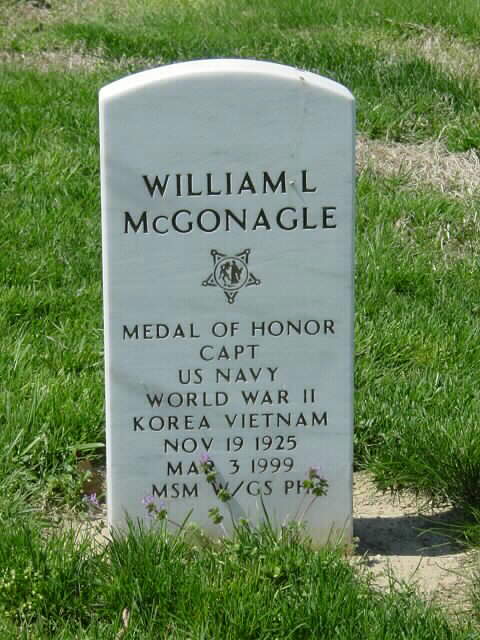
Michael Robert Patterson was born in Arlington and is the son of a former officer of the US Army. So it was no wonder that sooner or later his interests drew him to American history and especially to American military history. Many of his articles can be found on renowned portals like the New York Times, Washingtonpost or Wikipedia.
Reviewed by: Michael Howard

